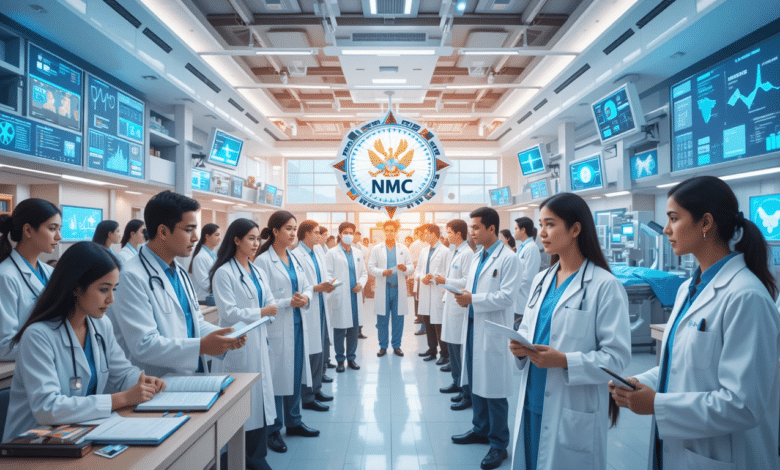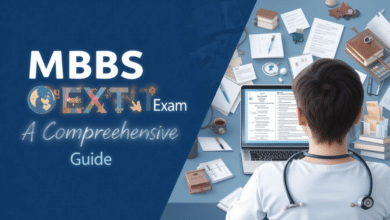National Medical Commission News: Transforming Medical Education and Healthcare in India

Introduction
The National Medical Commission (NMC) has been at the forefront of transforming India’s medical education and healthcare system. As the primary regulatory body, it replaces the erstwhile Medical Council of India (MCI) with the aim of fostering excellence and transparency. In this blog post, we delve into the latest National Medical Commission news, highlighting key reforms, policies, and their impact on various stakeholders.
Formation and Objectives of the National Medical Commission
The establishment of the National Medical Commission in September 2020 marked a significant shift in India’s medical regulatory framework. The primary objective of the NMC is to improve the quality of medical education and ensure the availability of skilled healthcare professionals. The latest National Medical Commission news indicates a strong focus on enhancing medical education standards and making healthcare more accessible.
Key Functions and Structure of the NMC
The NMC comprises four autonomous boards, each focusing on different aspects of medical education and practice: the Undergraduate Medical Education Board (UGMEB), the Postgraduate Medical Education Board (PGMEB), the Medical Assessment and Rating Board (MARB), and the Ethics and Medical Registration Board (EMRB). National Medical Commission news frequently covers the activities and decisions made by these boards to streamline medical education and maintain ethical standards.
NEET and NEXT: Revolutionizing Medical Examinations
One of the major reforms covered in recent National Medical Commission news is the introduction of the National Eligibility cum Entrance Test (NEET) and the National Exit Test (NEXT). NEET has become the single entrance examination for undergraduate medical courses across India, ensuring a uniform standard of assessment. NEXT, which is set to replace the traditional final year MBBS exams and postgraduate entrance tests, aims to further standardize medical education and ensure competency among graduates.
Emphasis on Medical Education Quality
Ensuring high-quality medical education is a recurrent theme in National Medical Commission news. The NMC has introduced several measures to improve the curriculum, including competency-based medical education (CBME), which emphasizes practical skills and clinical exposure. Regular updates highlight the Commission’s efforts to revise syllabi, integrate modern teaching methods, and incorporate feedback from educational institutions.
Regulation of Medical Colleges
National Medical Commission news often focuses on the regulation of medical colleges. The NMC has implemented stringent guidelines for the establishment and functioning of medical institutions to ensure they meet required standards. This includes periodic assessments, infrastructure audits, and faculty evaluations. These measures aim to eliminate substandard colleges and ensure students receive quality education.
Enhancing Faculty Development Programs
The NMC places a strong emphasis on faculty development, recognizing that competent educators are crucial for quality medical training. National Medical Commission news highlights various initiatives such as workshops, training programs, and continuous professional development courses designed to enhance the teaching skills and subject knowledge of medical faculty.
Promoting Research and Innovation
Research and innovation are critical components of modern medical education. According to recent National Medical Commission news, the NMC encourages medical colleges to promote research activities and innovations. Grants, scholarships, and collaborative projects with international institutions are some of the initiatives aimed at fostering a research-oriented environment among medical students and faculty.
Addressing Ethical Issues in Healthcare
Ethical practice in medicine is a cornerstone of the NMC’s mandate. National Medical Commission news often covers the Commission’s efforts to address ethical issues and ensure that medical professionals adhere to the highest standards of integrity and professionalism. The Ethics and Medical Registration Board (EMRB) plays a pivotal role in this regard, handling complaints, conducting disciplinary proceedings, and updating ethical guidelines.
Impact of COVID-19 on Medical Education
The COVID-19 pandemic has significantly impacted medical education and healthcare delivery worldwide. National Medical Commission news has extensively covered how the NMC has responded to these challenges. The Commission has introduced flexible guidelines for online education, revised assessment methods, and ensured that medical institutions adhere to safety protocols while continuing to train healthcare professionals effectively.
Future Directions and Upcoming Reforms
The future of medical education and healthcare in India is a recurring topic in National Medical Commission news. The NMC is continuously working on new reforms to address emerging challenges and improve the healthcare system. Upcoming initiatives include the introduction of telemedicine guidelines, integration of technology in medical education, and policies aimed at rural healthcare development.
Conclusion
The National Medical Commission is playing a transformative role in shaping India’s medical education and healthcare system. By staying informed through National Medical Commission news, students, professionals, and patients can understand the significant changes and their implications. The NMC’s commitment to enhancing education quality, ethical standards, and accessibility is set to bring about a positive impact on the healthcare landscape in India.
FAQs
Q1: What is the National Medical Commission?
A1: The National Medical Commission (NMC) is the regulatory body that replaced the Medical Council of India (MCI) in 2020. It aims to improve the quality of medical education and ensure the availability of skilled healthcare professionals in India.
Q2: What are NEET and NEXT exams?
A2: NEET (National Eligibility cum Entrance Test) is the single entrance examination for undergraduate medical courses in India. NEXT (National Exit Test) is a proposed examination to replace final year MBBS exams and postgraduate entrance tests, ensuring standardized medical education and competency among graduates.
Q3: How does the NMC regulate medical colleges?
A3: The NMC implements stringent guidelines for the establishment and functioning of medical colleges, including periodic assessments, infrastructure audits, and faculty evaluations to ensure high standards of education.
Q4: What measures has the NMC taken during the COVID-19 pandemic?
A4: The NMC has introduced flexible guidelines for online education, revised assessment methods, and ensured adherence to safety protocols in medical institutions to continue effective training of healthcare professionals during the pandemic.
Q5: What are the future plans of the National Medical Commission?
A5: The NMC is working on upcoming reforms such as telemedicine guidelines, integration of technology in medical education, and policies aimed at improving rural healthcare, among other initiatives to enhance the healthcare system in India.




